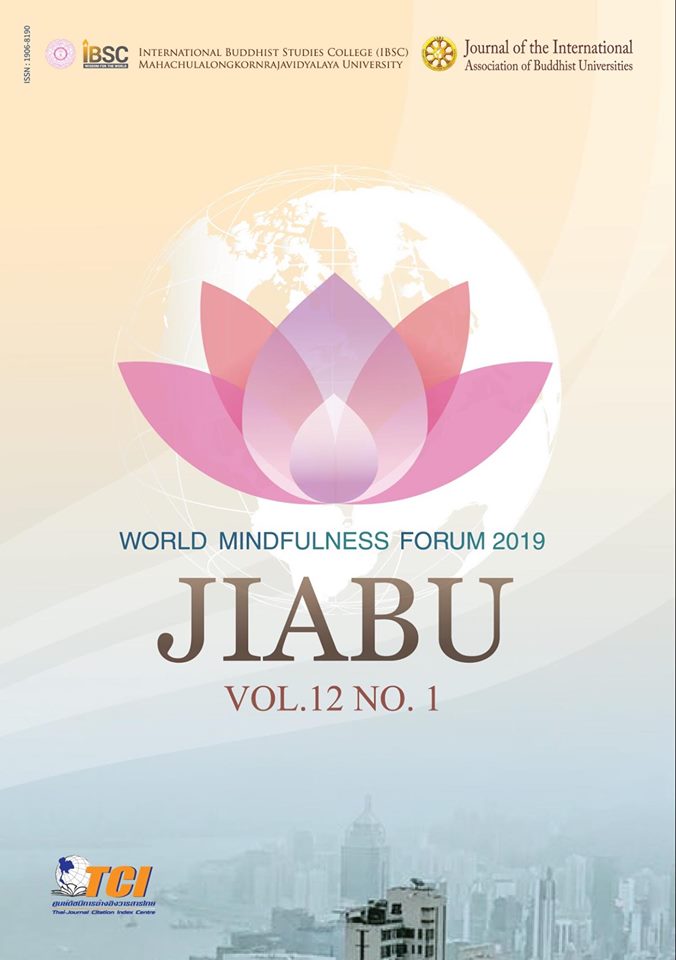Conflict Management by Buddhist Peaceful Means of Loving-kindness (metta)
Main Article Content
Abstract
This paper aims to present the conflict management by Buddhist peaceful means of
loving-kindness. This studying applies the Buddhist perspective on the causes of conflict,
ways to manage on conflict and realizing the peace by practical ways of loving-kindness,
modern approach of Buddhist loving-kindness and mindfulness meditation. So, the researcher
will explore the potentials of loving-kindness and Buddhist contributions to the peacemaking
efforts of peace in the present day. The Buddhist loving-kindness and mindfulness can
be utilized as a conflicts resolution in human society. Loving-kindness is one of the best
things among the four sublime Dhamma and it is a solution of conflicts which is non-violent
intervention. The Buddhist outlook is premature in accordance with the insights of peace
studies that are the process of peace and insistence of peace. And, the holistic framework of
peace would play a vital role in the efforts of bringing the culture of peace into existence
in the world. Therefore, the researcher will explore conflict management by Buddhist
loving-kindness and mindfulness in human societies.
Article Details
Views and opinions expressed in the articles published by The Journal of the International Association of Buddhist Universities (JIABU), are of responsibility by such authors but not the editors and do not necessarily reflect those of the editors.
References
Barash, P. D. The Cause of War - Approach to Peace. New York: Oxford. 2000.
Bodhi, Bhikkhu (2006). Comprehensive Manual of Abhidhamma: The Philosophical
Psychology of Buddhism. Kandy: Buddhist Publication Society.
Bodhi, Bhikkhu (2012). The Numerical Discourse of the Buddha. Anguttara Nikaya.
Boston: Wisdom Publication Society.
Buddharakkhita, Acharya (trs.) (1996). Dhammapada. Kandy: Buddhist Publication Society.
Candy, D. (2008). Peace in the Buddha’s Discourse. Buddhist Publication Society, Kandy.
Dalai Lama (1978). Address to the U.S. Congressional Human Right’s Caucus. United
States, September 21.
Dalai Lama (1998). The Art of Happiness. America: Penguin Group.
Daw Mya Tin (1995). Dhammapada: Verses and Stories. Myanmar Pitaka Association,
Yangon, Myanmar.
Dhammananda, K.S. (1988). The Dhammapada. Malayasia: Sasana Abhiwurdhi Wardhana
Society.
Druckman, D. and Diehl, P. F. (2006). Confl ict and Resolution. London.
Feer, M. L. and Rhys Davids, C.A. (1991). Saṃyutta Nikāya. Vol. I, Oxford.
Hardy, E (ed.). (1976). Aṅguttara Nikāya. Vols. III-V, Oxford: PTS.
Jayawickrama, N.A. (2001). Suttanipata. Text and Translations.
Lati Rinpoche and Hopkins, J. (1997). Death, Intermediate State, and Rebirth.
Mon Mehm Tim (2004). Buddha Abhidhamma Ultimate Science.
Nanamoli, Bhikkhu (2010). Visuddhimagga. The Path of Purification. Kandy, Buddhist
Publication Society.
Nanamoli, Bhikkhu (trans.) (2015). Mindfulness of Breathing. Kandy: Buddhist Publication
Society.
Nānamoli, Thera (1994). A Practice of Loving-Kindness (Metta): As Taught by the Buddha
in the Pali Canon. Kandy, Buddhist Publication Society.
Oldenberg H. (ed.) (1969-1982). Vinaya Pitaka. Oxford: PTS.
Phuthisarn, C. (2001). Peace Under Condition of Conflict in Society and Politics. Bangkok:
Chulalongkorn.
Reymond, W.M. and Pease, J. (1973). Sociology and Social Life. New York: D Van Nostrand
Company.
Somaratne G.A. (ed.) (1996). Saṃyutta Nikāya. Vol.II. Oxford: PTS.
Windisch, E. (ed.) (1994). Itivuttaka. London: PTS.

